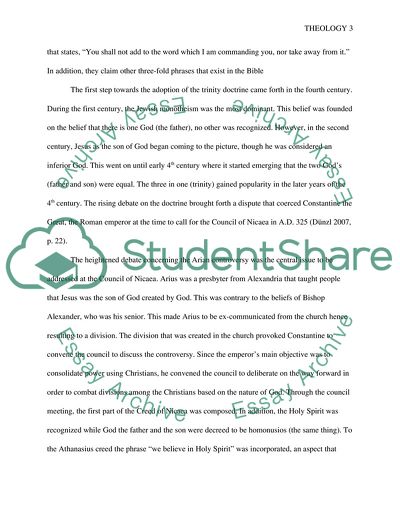Cite this document
(Churchs Definition of Trinity, Filioque Controversy and Role of Holy Spirit in Contemporary Theology Essay Example | Topics and Well Written Essays - 2000 words, n.d.)
Churchs Definition of Trinity, Filioque Controversy and Role of Holy Spirit in Contemporary Theology Essay Example | Topics and Well Written Essays - 2000 words. https://studentshare.org/religion-and-theology/1835767-consider-in-summary-form-the-steps-in-the-churchs-definition-of-the-trinity-as-one-god-in-three-persons-hypostaseis-then-give-a-critical-evaluation-of-the-filioque-controversy-and-role-of-the-holy-spirit-for-contemporary-theological-disc
Churchs Definition of Trinity, Filioque Controversy and Role of Holy Spirit in Contemporary Theology Essay Example | Topics and Well Written Essays - 2000 words. https://studentshare.org/religion-and-theology/1835767-consider-in-summary-form-the-steps-in-the-churchs-definition-of-the-trinity-as-one-god-in-three-persons-hypostaseis-then-give-a-critical-evaluation-of-the-filioque-controversy-and-role-of-the-holy-spirit-for-contemporary-theological-disc
(Churchs Definition of Trinity, Filioque Controversy and Role of Holy Spirit in Contemporary Theology Essay Example | Topics and Well Written Essays - 2000 Words)
Churchs Definition of Trinity, Filioque Controversy and Role of Holy Spirit in Contemporary Theology Essay Example | Topics and Well Written Essays - 2000 Words. https://studentshare.org/religion-and-theology/1835767-consider-in-summary-form-the-steps-in-the-churchs-definition-of-the-trinity-as-one-god-in-three-persons-hypostaseis-then-give-a-critical-evaluation-of-the-filioque-controversy-and-role-of-the-holy-spirit-for-contemporary-theological-disc.
Churchs Definition of Trinity, Filioque Controversy and Role of Holy Spirit in Contemporary Theology Essay Example | Topics and Well Written Essays - 2000 Words. https://studentshare.org/religion-and-theology/1835767-consider-in-summary-form-the-steps-in-the-churchs-definition-of-the-trinity-as-one-god-in-three-persons-hypostaseis-then-give-a-critical-evaluation-of-the-filioque-controversy-and-role-of-the-holy-spirit-for-contemporary-theological-disc.
“Churchs Definition of Trinity, Filioque Controversy and Role of Holy Spirit in Contemporary Theology Essay Example | Topics and Well Written Essays - 2000 Words”. https://studentshare.org/religion-and-theology/1835767-consider-in-summary-form-the-steps-in-the-churchs-definition-of-the-trinity-as-one-god-in-three-persons-hypostaseis-then-give-a-critical-evaluation-of-the-filioque-controversy-and-role-of-the-holy-spirit-for-contemporary-theological-disc.


